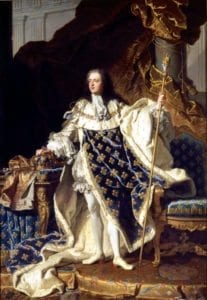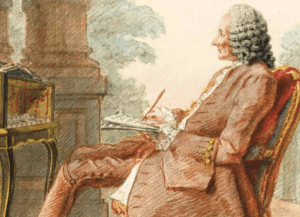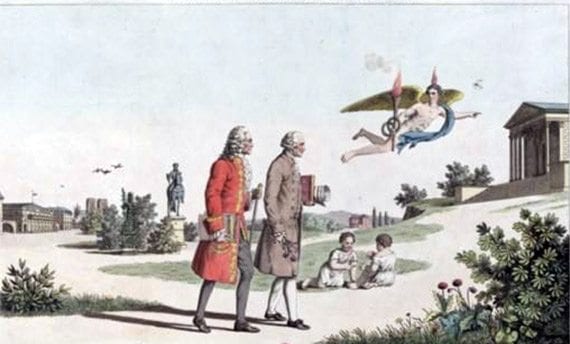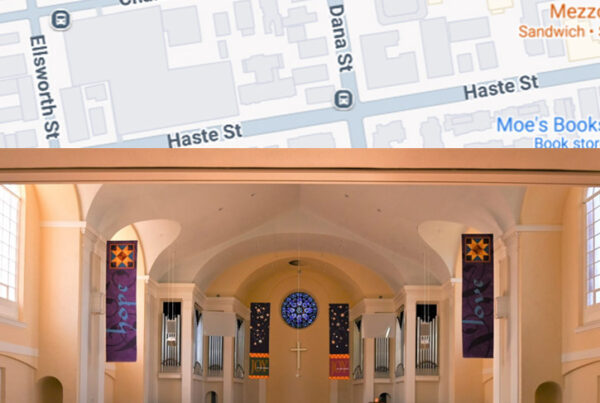RAMEAU & VOLTAIRE: A Brief History of Collaboration and Contention
(Part 2 of 2)
Bruce Lamott

King Louis XV of France by H. Rigaud 1730
A self-aggrandizing tyrant decides to enjoy an evening of theatrical entertainment after defeating an alliance of Western European nations. However, instead of receiving the musical adulation he was expecting, he receives a not-so-thinly veiled morality lesson in governance delivered by a cast of historical characters. Hamilton, you ask? No, it was the back-handed compliment paid to King Louis XV by Voltaire in his libretto for Rameau’s opéra-ballet, Le temple de la Gloire (The Temple of Glory).
The very title must have disarmed the pompous monarch, who, expecting an apotheosis on account of his military victory at Fontenoy, was caught quite off-guard, seeing a musical spectacle in which envy, tyranny, pugnaciousness, and debauchery are banned at the steps of the Temple of Glory, while magnanimity and forgiveness transform the scene into a Temple of Happiness for the whole world: “Each rank, each sex, each age must strive for happiness,” declares a Roman woman, “On such a splendid day there are no calls to war,” responds a Roman warrior.

Voltaire
Not content with mere allegory to deliver his message, Voltaire cheekily asked the King after the performance, “Is Trajan pleased?,” leaving no question that he identified Louis with the magnanimous and clement Roman emperor seen in the final act of the opera. The King met this lese majesté with stony silence. Given the fawning tone of Voltaire’s recently published 13-page poem, La Bataille de Fontenoy, published on June 9, 1745 (between the epic French victory on May 11 and the premiére of the opéra-ballet on November 27), the King had every reason to expect more of the same.
The pressing production schedule for Le Temple gave little opportunity for further contention between Voltaire and Rameau. The two lanky artistes had clearly expressed their dislike for one another while begrudgingly admitting to the talent of the other. Either they had ironed out their differences (doubtful) or were too occupied to quarrel further. Rameau wrote two major works in the nine months between his previous collaboration with Voltaire, La princesse de Navarre (February 23): a comédie-lyrique Platée (performed by Philharmonia and Cal Performances in 1998) and an opéra-ballet, Les fêtes de Polymnie–both with other librettists. Meanwhile, Voltaire had reached a standoff in society, and Voltaire acquiesced to Rameau’s musical decisions. Further conflict erupted when an unsuccessful “rewrite” was made for a Parisian audience in 1746; the heat of victory had cooled, an admission-paying public was less inclined to accept the glorification of a king no longer in attendance. Voltaire and Rameau were never to work together again.

Jean-Philippe Rameau
Their standings thereafter with the royal court were shifting in contrary motion. Rameau, already 62, was in the ascendant. He was to produce at least sixteen more operas and ballets with prémieres at the Palais-Royale in Paris, or in the royal “chateaux” of Versailles and Fontaineblau. His music bridged the divide between French and Italian operatic styles, and his novel use of the orchestra formed a foundation for the art of orchestration. He was hailed as “the Newton of music” for his enlightened and original theoretical writings which are still basic to the study of music theory and harmony.
Within a year, however, Voltaire, 51, would lose favor with the court, having accused the royals of cheating at cards among other affronts, and would spend the rest of his life at the court of Frederick the Great in Prussia and in the environs of Geneva. Louis XV banned him from Paris in 1754. This is the Voltaire most familiar to us: the irreverent Enlightenment philosophe and satirist (Candide appeared in 1759) who disparaged his life at court and continued to poke at the soft underbelly of the French monarchy.
See Philharmonia’s first fully staged opera, Rameau’s Le Temple de la Gloire, April 28-30 at Zellerbach Hall.






